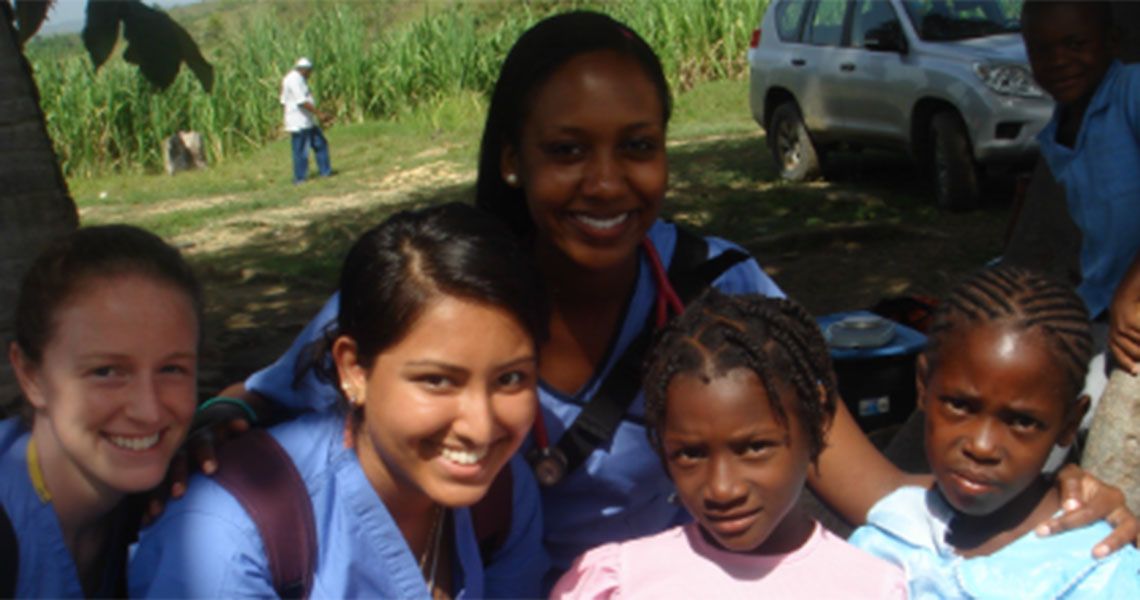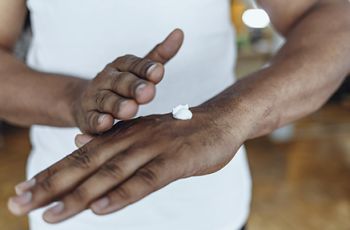Nestled around the village of Marmont, in Haiti’s impoverished Central Plateau sits The George Washington University (GW) School of Medicine and Health Sciences (SMHS) adopted clinic. Outside the clinic, long lines of Haitian men, women, and children have formed, waiting their turn to receive essential medical care and health education information from students, faculty, alumni from SMHS, the School of Public Health and Health Services, and the School of Nursing. During the seven-day medical mission, July 8–15, the team saw more than 1,100 patients and treated everything from malnutrition and respiratory issues in children to adults with diabetes, arthritis, and hypertension. The multidisciplinary team also performed examinations and administered much needed medications. “These students practiced medicine entirely through interviews and physical examinations,” said Jack Summer, M.D. ’81, clinical associate professor of medicine at SMHS. “They were forced to rely on their hands and clinical skills to treat patients because medical tests and tools were scarce.”
Summer, a veteran who has lead the program since 2005, accompanied this year’s group made up of Deborah Pulver, M.D., and Jeremy Kern, M.D., both from Children’s National Medical Center, Margorie Graziano, R.N., Jacqueline Wavelet, R.N., and Erin Yealgey, D.N.P., from the GW School of Nursing along with six medical students, four public health students, three nursing students, and one pre-med undergraduate. For Amanda Eisenberg, a fourth-year medical student, administering care to Haitians was a definite culture shock. She not only experienced extreme heat and humidity, but witnessed firsthand the poverty that many of the people she treated endure daily. “I was given the opportunity to treat and see many different medical conditions, such as a bow-legged 3-year-old-boy with rickets, which is a disorder caused by a lack of vitamin D, calcium, or phosphate, and a 40-year-old-women with a massive goiter,” said Eisenberg.
This trip to Haiti marks GW’s tenth successful medical mission since the International Medicine Program established an affiliation with Project Medishare, a nonprofit founded in 1995 by Drs. Barth Green and Arthur Fournier. The organization is dedicated to sharing its human and technical resources with its Haitian partners in an effort to achieve quality health care for all Haitians, with an emphasis on rural community health. In 2004, SMHS and Project Medishare established a partnership in an effort to improve health services and education to the community of Thomonde in the Central Plateau of Haiti.
Over the years, Summer has seen an increase in the university’s involvement and commitment to the medical mission in Haiti. More and more schools within the university are taking a more active role in this medical mission. “Along with the School of Medicine and Health Sciences and the School of Public Health and Health Services, the School of Nursing is now very committed to this cause,” said Summer.
Armed with the goals of establishing and funding sustainable programs in Haiti’s rural communities, helping to train Haitian physicians, community health workers, and nurses, and providing technology, supplies, and manpower for the Thomonde clinics, the team worked alongside Project Medishare’s community health workers to better understand and help alleviate the severity of health problems in this area. Culture and language barriers presented several challenges for the students. “Although we had translators traveling with our group, not being able to speak directly with the patients created a disconnect between the patient and medical provider,” said Eisenberg.
Zakiya Chambers, a second-year masters of public health student with a concentration in community-oriented primary care, said that her experience in Haiti strengthened her ability to think outside the box. She witnessed first-hand the wide range of chronic conditions that plague this poverty-stricken nation, which people rarely think about in the United States. “Treating Haitian men, women, and especially children, who are less fortunate than myself opened my eyes to how important public health really is,” said Chambers.
The trip presented several challenges for Thai Kelley, a family nurse practitioner III student. “One of the main challenges was learning to simplify follow-up instructions when treating patients that you have only one chance to see,” said Kelley. Prescribing families with multiple medications with their own set of doses, times, and durations was especially difficult for Kelley even with the help of a translator. This left Kelley with lingering doubts as to the efficacy of treatment regimens, as well as the dangers.
Kelley’s experience in Haiti made her realize that no matter how much an individual brings to the table in terms of technology and material know-how, the simple truth is that health care will always be under the control of the human heart and spirit.
For this group of students and faculty, their medical mission to Haiti was an invaluable experience, which showed the impact sympathy and support can have on the success of treatment. “The Haitians were so grateful to have us in their community helping to provide medical care,” said Eisenberg. “I believe our presence provided them with a sense of hope.” It was difficult for Kelley to put into words what the mission meant to her. “As a nurse, there can be no greater satisfaction than to use both my skills and education to help those who are in such great need,” said Kelley. “I will definitely return to Haiti one day to continue the work our team started.”
The Office of International Medicine Programs is currently planning medical missions to Haiti for March and July of 2013.



